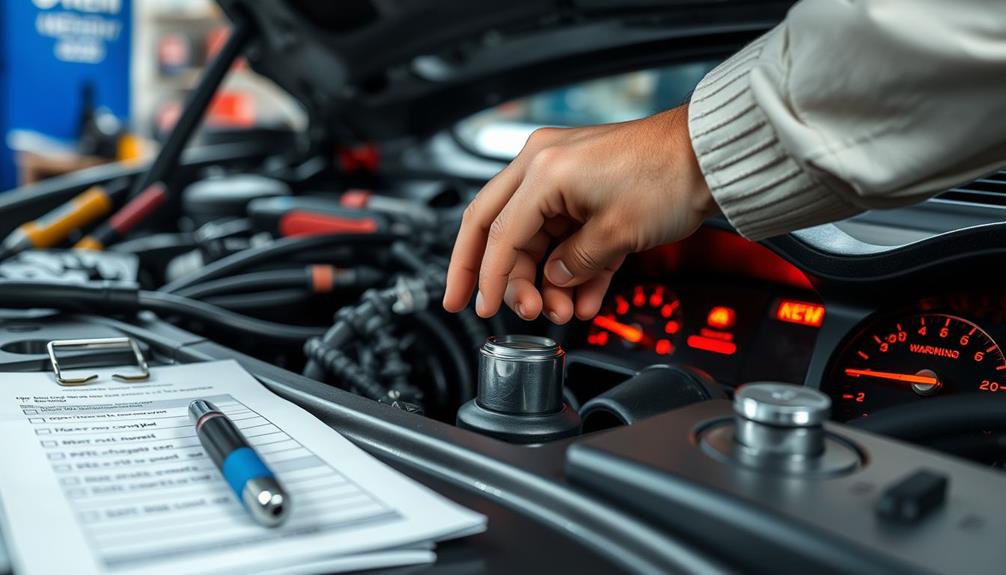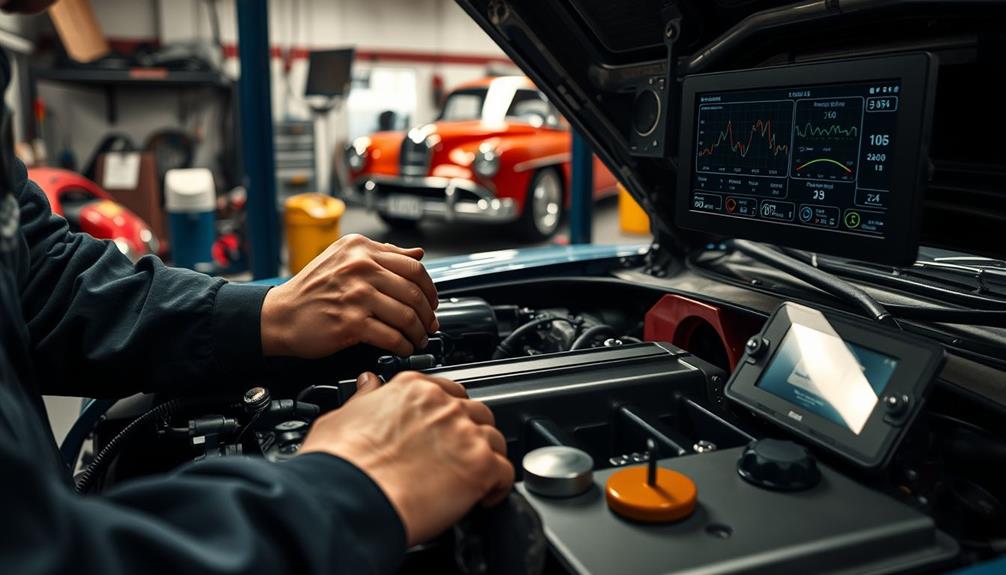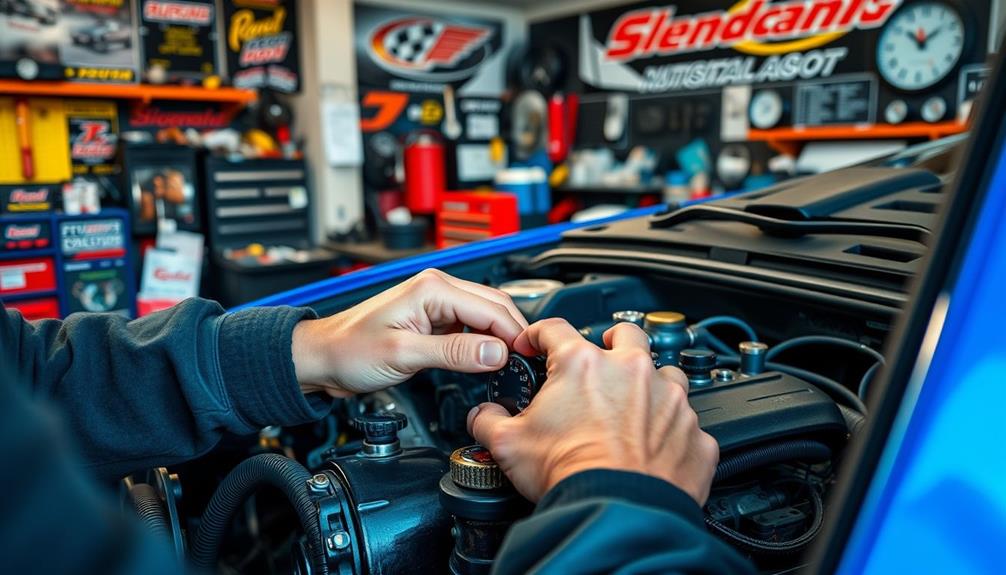If you're noticing a drop in fuel mileage, difficulty starting your engine, or unfamiliar noises, it's time to contemplate a tune-up. Dashboard warning lights, particularly the check engine light, also signal maintenance is due. Regular tune-ups boost your car's performance and prevent costly repairs down the line. If you're experiencing a decline in braking capacity or shaking while braking, you need urgent service. Staying proactive with your car's upkeep can enhance its longevity and safety. Keep an eye out for these signs, and you'll discover more about the importance of maintaining your vehicle.
Key Takeaways
- A decrease in fuel mileage often indicates engine inefficiencies requiring a tune-up.
- Difficulty starting the engine may signal issues with spark plugs or the battery.
- Unfamiliar noises like thumping or screeching suggest loose parts or low fluids.
- Dashboard warning lights, especially the check engine light, indicate necessary maintenance.
- Gradual decline in braking capacity or shaking while braking necessitates urgent service attention.
Signs Your Car Needs a Tune-Up
When your car starts acting up, it's often trying to tell you it needs a tune-up. Pay attention to the signs your car needs a tune-up, like a notable decrease in fuel mileage. This can indicate engine inefficiencies or misalignment that require your attention.
If you hear unfamiliar noises—like thumping or screeching—those could signal loose parts or low fluids, both of which need checking.
Don't ignore dashboard warning lights, especially the check engine light. They're often early indicators of maintenance needs and neglecting them can lead to costly repairs.
Difficulty starting your engine is another strong sign that you're due for a tune-up, often stemming from issues with spark plugs or the battery.
Lastly, be alert for a gradual decline in braking capacity or any sudden shaking while braking. These symptoms indicate urgent service is required to guarantee vehicle safety.
Addressing these signs promptly can save you from more significant issues down the road. Regular attention to these indicators not only keeps your car running smoothly but also enhances your overall driving experience.
Importance of Regular Maintenance
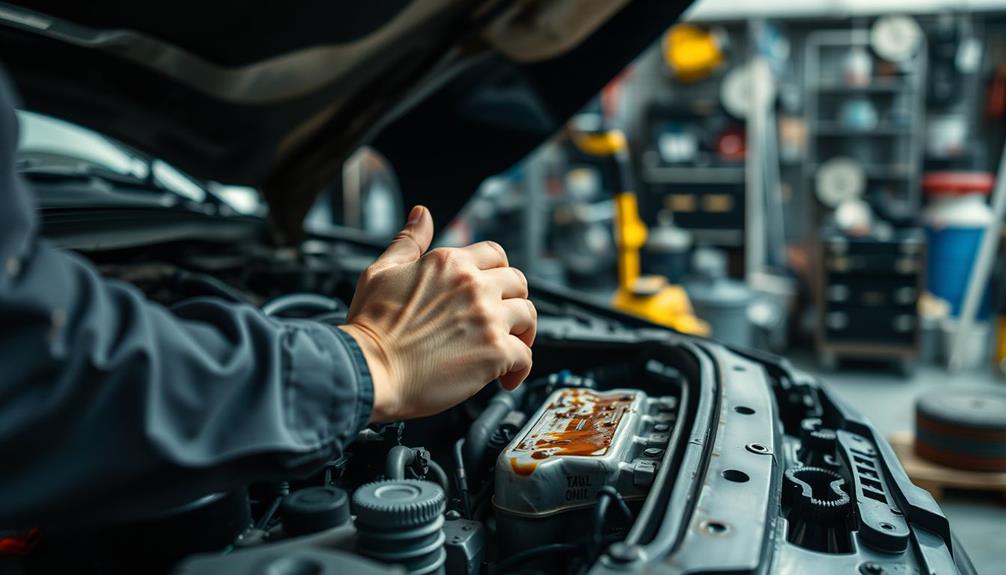
Regular maintenance is essential for keeping your vehicle in top shape and ensuring your safety on the road. By scheduling regular tune-ups, you enhance your vehicle performance and fuel efficiency, allowing for peak operation while reducing long-term expenses. Ignoring routine maintenance can lead to noticeable performance issues and might compromise the safety of the vehicle, putting you and others at risk.
One of the key benefits of regular maintenance is early problem detection. By identifying issues before they escalate, you can avoid costly repairs that could arise from neglected problems. Additionally, consistent service helps extend the engine lifespan and the longevity of its components, saving you money over time.
Moreover, maintaining your vehicle through regular tune-ups helps preserve its resale value. A well-maintained car is more appealing to potential buyers, as it signals reliability and care.
What to Expect During a Tune-Up
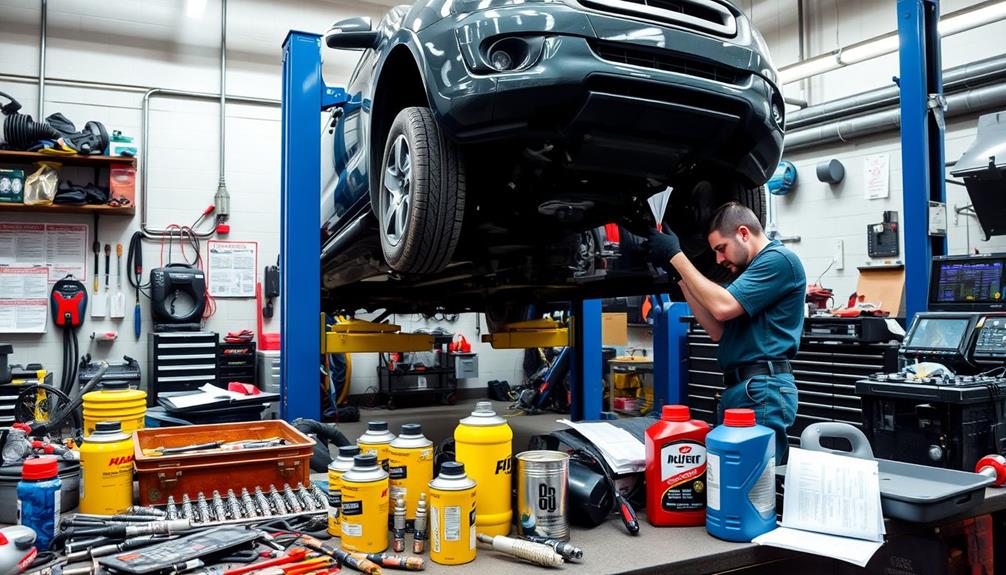
What should you expect during a tune-up? Typically, a tune-up takes between 1 to 4 hours, depending on your vehicle model and its maintenance history.
You'll start with a thorough inspection of key components like spark plugs, air filters, and brake systems. This guarantees your vehicle's peak performance and safety.
Expect your mechanic to check and potentially replace fluids, as maintaining proper fluid levels is essential for your vehicle's operation. They'll also perform extensive vehicle diagnostics to identify any underlying issues that could affect performance.
Regular tune-ups enhance your vehicle's longevity and fuel efficiency, helping it run smoother and more efficiently. By addressing small problems before they escalate, you're investing in the overall health of your vehicle.
Modern vehicles might've advanced technology that simplifies maintenance, but don't overlook the importance of routine checks. Confirming that your brake systems and other essential components are in prime shape contributes to your safety on the road.
Common Tune-Up Services

When it comes to common tune-up services, you'll want to pay attention to key components that keep your engine running smoothly.
Essential maintenance tasks like inspecting spark plugs and changing oil can greatly enhance performance and fuel efficiency.
Key Tune-Up Components
While many drivers overlook the importance of tune-ups, key components like spark plugs, air filters, and fluid changes are essential for keeping your vehicle running smoothly.
Spark plugs play a significant role in optimal engine performance and fuel efficiency; replacing them during a car tune-up can greatly enhance your driving experience.
Another important component is the air filter; a clean air filter guarantees proper airflow to the engine, boosting performance and fuel economy.
Regular fluid changes, including oil change and brake fluid replacement, maintain your vehicle's internal components and promote safe operation.
Additionally, tire rotation is often part of tune-up services, helping to guarantee even tire wear and improve handling.
This practice not only extends the lifespan of your tires but also enhances your safety on the road.
Essential Maintenance Tasks
To keep your vehicle running at its best, it's essential to prioritize important maintenance tasks during a tune-up. A proper tune-up is significant for sustaining your vehicle's performance and preventing future issues.
Here are three key tasks you shouldn't overlook:
- Oil Changes: Regular oil changes guarantee your engine runs smoothly and maintain engine efficiency. Dirty oil can lead to increased wear and tear, harming your vehicle.
- Fluid Top-Offs: Checking and topping off fluids like coolant, brake, and transmission fluid is important for peak vehicle handling and performance.
- Spark Plug Inspection/Replacement: Worn spark plugs can negatively affect fuel economy and engine performance. Regular inspections or replacements can keep your engine firing correctly.
Additionally, thorough diagnostics are necessary during a tune-up to identify any hidden problems before they escalate into costly repairs.
Don't forget to check your air and fuel filters, battery, and tire alignment as part of these maintenance tasks. Staying on top of these services won't only enhance your vehicle's performance but also provide a safer driving experience.
Cost Factors for Tune-Ups
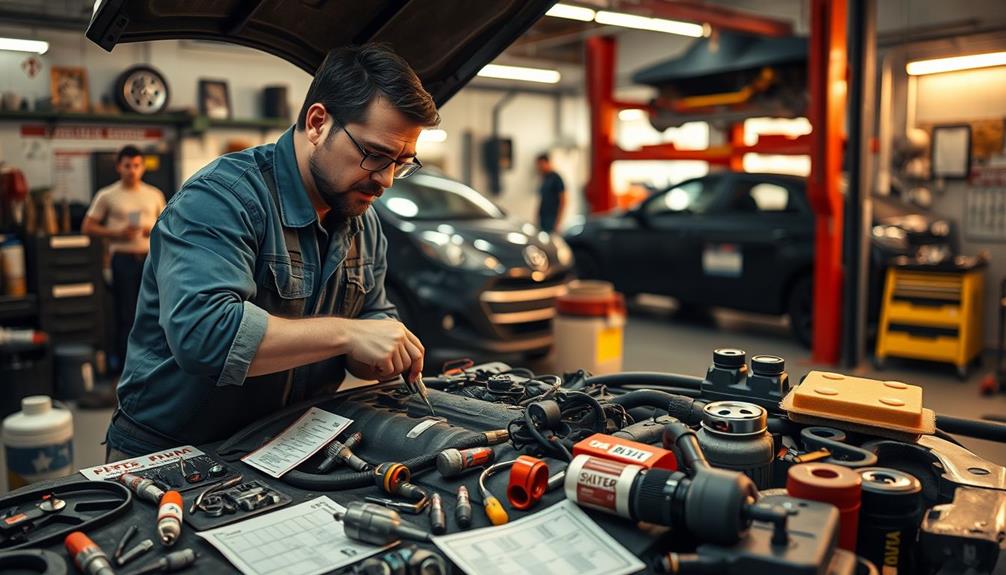
When you're considering a tune-up, the age of your vehicle can greatly impact the cost, as older cars often need more extensive repairs.
The complexity of the issues found during the service also plays a role, with multiple problems leading to higher expenses.
Additionally, where you live can affect pricing, since labor rates vary between regions and dealerships.
Vehicle Age Impact
How does the age of your vehicle affect tune-up costs? The vehicle age plays a significant role in determining what you'll pay for maintenance. As cars age, they tend to require more frequent tune-ups, leading to higher overall costs.
Additionally, understanding the financial implications of maintaining an older vehicle can be similar to the factors caregivers face when planning for assisted living expenses.
Here are three key factors to take into account:
- Wear and Tear: Older vehicles have more wear and tear on components, which can increase the need for repairs.
- Service Fees: Vehicles over ten years old often incur higher service fees due to outdated technologies and harder-to-find parts.
- Repair Complexity: As your vehicle ages, the complexity of repairs can rise, leading to increased labor costs associated with tune-up services.
In short, maintaining an older vehicle can become costly. The need for frequent tune-ups, coupled with potential increases in service fees and repair complexity, can add up quickly.
If your car is getting older, it's important to budget for these maintenance expenses. Staying proactive can help you manage tune-up costs and keep your vehicle running smoothly for years to come.
Repair Complexity Influence
As vehicles age, the complexity of repairs tends to increase, which can greatly affect your tune-up costs. Older models often require more extensive maintenance due to wear and tear, which means you could face higher service rates. The intricacy of the repairs can also drive up labor costs since specialized knowledge and tools may be needed for engine work.
Here's a quick look at how repair complexity can impact your costs:
| Service Type | Cost Influence |
|---|---|
| Regular Tune-Up | Base cost |
| Fluid Changes | Additional expenses |
| Brake Inspections | Potentially higher |
When it comes to your vehicle, each regular tune-up can help catch issues before they escalate. However, if you're opting for additional services like fluid changes or brake inspections, be prepared for an increase in your overall bill. By staying proactive with maintenance, you can mitigate costly repairs down the line and keep your vehicle running smoothly.
Geographic Location Variance
Regional differences greatly impact the cost of vehicle tune-ups, creating a landscape where prices can vary widely. If your car needs a tune-up, it's crucial to understand how geographic location plays a role in the overall cost.
Here are three key factors to take into account:
- Urban vs. Rural: Urban areas often have higher labor rates, with standard tune-up costs ranging from $100 to $300. In contrast, rural regions might only charge between $80 and $200.
- Cost of Living: Local economic factors, including cost of living, markedly influence how much you'll pay. Areas with a higher cost of living typically see increased prices for maintenance services.
- Vehicle Makes and Models: Some vehicle makes or models may incur additional charges due to limited parts availability or specialized labor, depending on your location.
Additionally, geographic variations can affect the frequency of recommended maintenance. For instance, driving conditions and climate may lead to different service intervals, further impacting your overall maintenance costs.
Be sure to research local service providers to find the best options for your vehicle's needs.
Scheduling Your Tune-Up
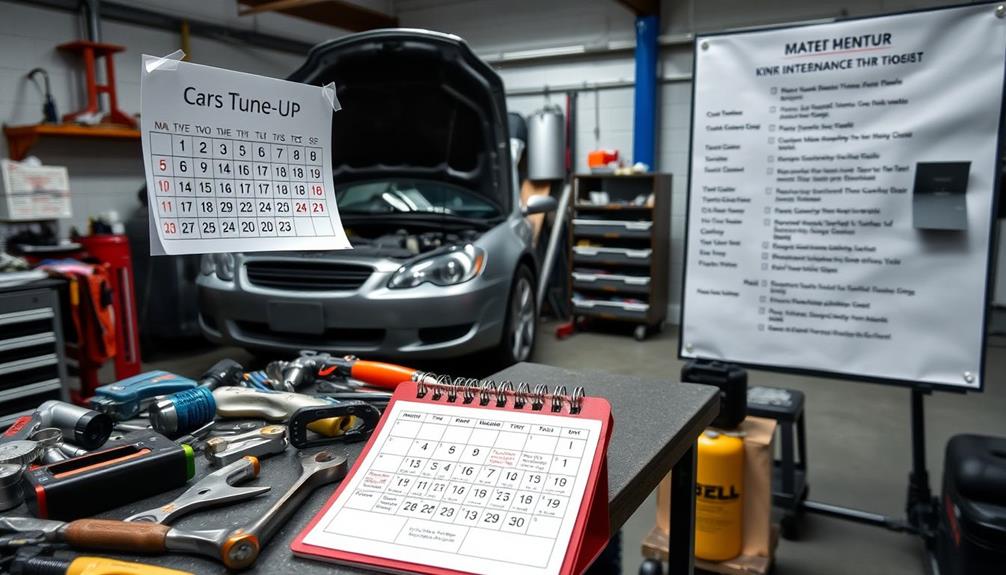
To keep your vehicle running smoothly, scheduling a tune-up early is key. Ideally, you should schedule your next tune-up every 30,000 miles, with major services at 60,000 and 100,000 miles. This proactive maintenance approach helps you avoid being overdue for maintenance, guaranteeing peak vehicle performance.
When you have regular maintenance records available, the tune-up process can be quicker. Well-maintained vehicles typically require less time for service, often taking just 1 to 4 hours, depending on the model and maintenance history. By scheduling a tune-up ahead of time, you minimize vehicle downtime and keep your day on track.
Furthermore, don't forget to check for service specials and offers that can provide cost-effective options for your tune-up. Taking advantage of these deals not only helps you save money but also guarantees that your vehicle stays in top shape.
DIY Vs. Professional Maintenance

When it comes to vehicle maintenance, deciding between DIY tasks and professional service can be tricky. You might be tempted to tackle minor tasks yourself, like oil changes or air filter replacements, since DIY maintenance can be cost-effective.
However, here are three key considerations:
- Safety Concerns: Critical systems, such as brakes and engines, require expert attention. Errors in these areas can lead to serious consequences, much like the importance of selecting the right cold medications for effective relief.
- Advanced Diagnostic Equipment: Professional mechanics have access to tools that can identify underlying problems you might overlook, making their expertise invaluable for complex issues.
- Time Savings: Trained mechanics can complete a tune-up efficiently, often in just a few hours, while a DIY approach may take considerably longer.
Moreover, be cautious with DIY repairs, as improper work could result in your warranty being voided.
If you're confident in your skills and dealing with minor tasks, go for it! But for anything more complex or safety-related, it's wise to trust the professionals.
Balancing cost and safety will guarantee your vehicle remains in top shape.
Future Maintenance Tips and Resources

As you think about your vehicle's future maintenance needs, staying organized and informed can make all the difference.
First, keep a detailed record of all maintenance performed. This service history will help you identify repair patterns over time, allowing you to anticipate future needs. Regular upkeep is essential, so evaluate your driving habits. Frequent short trips or heavy loads may require more frequent adjustments to your service schedule.
Stay informed about any vehicle recalls or updates by checking the manufacturer's website or signing up for alerts. This proactive approach guarantees your vehicle remains safe and compliant.
Additionally, consider investing in protective services like paint coatings or rust-proofing to extend your vehicle's lifespan and maintain its appearance.
Frequently Asked Questions
How Can You Tell if Your Car Needs a Tune-Up?
You can tell your car needs a tune-up by noticing decreased fuel mileage, unusual noises, dashboard warning lights, difficulty starting, or declining braking performance. Address these signs promptly to avoid further issues and costly repairs.
When Would a Car Need a Tune-Up?
A car needs a tune-up when you notice decreased fuel mileage, strange noises, dashboard warning lights, or difficulty starting. Regular maintenance every 30,000 miles helps guarantee your vehicle performs at its best and avoids costly repairs. Car tuneup importance cannot be understated. By ensuring your vehicle is regularly checked and maintained, you can catch potential issues before they become major problems. This not only saves you money in the long run but also helps to prolong the life of your car. Regular tune-ups also contribute to a safer driving experience for you and your passengers.
What Happens if You Don't Get a Tune-Up?
Neglecting a tune-up's like ignoring a ticking time bomb; it can lead to skyrocketing fuel costs, major repairs, and safety hazards. You risk engine failure, decreased efficiency, and costly accidents. Don't let small issues snowball!
Is a Tune-Up the Same as Scheduled Maintenance?
No, a tune-up isn't the same as scheduled maintenance. While a tune-up focuses on specific engine components, scheduled maintenance covers a broader range of services to guarantee your vehicle runs safely and efficiently.
Conclusion
In summary, keeping your car in top shape is essential for safety and performance. If you notice any signs that it's due for a tune-up, don't ignore them—your vehicle deserves better than to be a ticking time bomb on wheels! Regular maintenance not only extends your car's life but also saves you money in the long run. So schedule that tune-up today and enjoy the peace of mind that comes with a well-maintained ride.
